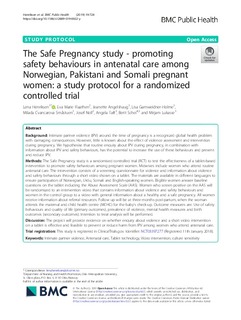| dc.contributor.author | Henriksen, Lena | |
| dc.contributor.author | Flaathen, Eva Marie | |
| dc.contributor.author | Angelshaug, Jeanette | |
| dc.contributor.author | Garnweidner-Holme, Lisa | |
| dc.contributor.author | Småstuen, Milada Cvancarova | |
| dc.contributor.author | Noll, Josef | |
| dc.contributor.author | Taft, Angela | |
| dc.contributor.author | Schei, Berit | |
| dc.contributor.author | Lukasse, Mirjam | |
| dc.date.accessioned | 2019-07-12T11:12:55Z | |
| dc.date.available | 2019-07-12T11:12:55Z | |
| dc.date.created | 2019-07-11T12:21:00Z | |
| dc.date.issued | 2019 | |
| dc.identifier.issn | 1471-2458 | |
| dc.identifier.uri | http://hdl.handle.net/11250/2605135 | |
| dc.description.abstract | Background
Intimate partner violence (IPV) around the time of pregnancy is a recognized global health problem with damaging consequences. However, little is known about the effect of violence assessment and intervention during pregnancy. We hypothesise that routine enquiry about IPV during pregnancy, in combination with information about IPV and safety behaviours, has the potential to increase the use of these behaviours and prevent and reduce IPV.
Methods
The Safe Pregnancy study is a randomised controlled trial (RCT) to test the effectiveness of a tablet-based intervention to promote safety behaviours among pregnant women. Midwives include women who attend routine antenatal care. The intervention consists of a screening questionnaire for violence and information about violence and safety behaviours through a short video shown on a tablet. The materials are available in different languages to ensure participation of Norwegian, Urdu, Somali and English-speaking women. Eligible women answer baseline questions on the tablet including the Abuse Assessment Scale (AAS). Women who screen positive on the AAS will be randomized to an intervention video that contains information about violence and safety behaviours and women in the control group to a video with general information about a healthy and a safe pregnancy. All women receive information about referral resources. Follow up will be at three months post-partum, when the woman attends the maternal and child health centre (MCHC) for the baby’s check-up. Outcome measures are: Use of safety behaviours and quality of life (primary outcomes), prevalence of violence, mental health measures and birth outcomes (secondary outcomes). Intention to treat analysis will be performed.
Discussion
The project will provide evidence on whether enquiry about violence and a short video intervention on a tablet is effective and feasible to prevent or reduce harm from IPV among women who attend antenatal care.
Trial registration
This study is registered in ClinicalTrials.gov. Identifier: NCT03397277(Registered 11th January 2018). | nb_NO |
| dc.language.iso | eng | nb_NO |
| dc.publisher | BMC (part of Springer Nature) | nb_NO |
| dc.title | The Safe Pregnancy study - promoting safety behaviours in antenatal care among Norwegian, Pakistani and Somali pregnant women: a study protocol for a randomized controlled trial | nb_NO |
| dc.type | Journal article | nb_NO |
| dc.type | Peer reviewed | nb_NO |
| dc.description.version | publishedVersion | nb_NO |
| dc.source.journal | BMC Public Health | nb_NO |
| dc.identifier.doi | 10.1186/s12889-019-6922-y | |
| dc.identifier.cristin | 1711249 | |
| dc.description.localcode | © The Author(s). 2019 Open Access This article is distributed under the terms of the Creative Commons Attribution 4.0 International License (http://creativecommons.org/licenses/by/4.0/) | nb_NO |
| cristin.unitcode | 194,65,20,0 | |
| cristin.unitname | Institutt for samfunnsmedisin og sykepleie | |
| cristin.ispublished | true | |
| cristin.fulltext | original | |
| cristin.qualitycode | 1 | |
